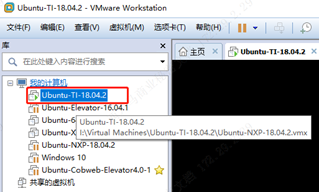1. 测试简介
使用开发板eth1网卡(与交换芯片88E6390X -Port9连接),经过交换芯片(Port1,对应前面板LAN1口)与PC机进行UDP通信测试。系统框图如下所示。

主控板运行nc命令或者运行自己编写的UDP测试程序。
nc命令使用参考:
https://www.cnblogs.com/nmap/p/6148306.html
UDP测试程序虚拟机路径:


PC机使用网络调试助手

网络调试工具-NetAssist以及Linux下的nc网络调试工具配合使用,参考:
https://cloud.tencent.com/developer/article/1739493?from=information.detail.linux%20udp%E6%B5%8B%E8%AF%95%E7%A8%8B%E5%BA%8F
2. 测试发现的问题
对于第一章节系统连接图中,红线数据流(PC机发UDP包,主控接收,正常),绿色数据流(主控发UDP包,PC机接收,PC机无法收到主控发出的UDP包)。
实际测试截图:
PC机IP地址为:192.168.253.110
主控板eth1网卡地址:192.168.253.100

主控使用nc命令启动UDP监听,PC机使用网络调试助手发UDP包。从以下截图可以看到主控已经收到PC机发的信息。

主控使用以前编译好的udp.exe工具进行持续发包测试,同时也可以接收UDP包。(udp.exe工具没有绑定网卡,可以复现发不出UDP包的问题;udp_test工具绑定了网卡,可以发出UDP包;后面章节会详细介绍)

从主控发出的UDP广播包,PC机的网络调试助手并未收到。使用Wireshark抓一下UDP包,也没有收到。
wireshark使用:
选择PC机以太网5,对应的IP地址是192.168.253.110;


并未收到任何信息:

主控ping一下PC机,看wireshark抓包结果:

3. 解决办法
经过排查,最终查明问题原因。

问题原因:主控端路由表中默认网关为eth0,测试时发UDP广播包时socket未绑定网卡,系统会走默认网关出去,而默认网关为eth0而不是eth1,导致UDP包并没有从eth1网卡发出。
解决办法:
办法1:
路由表中添加eth1默认网关,但这样会影响eth0网卡的使用,不推荐;
Linux添加默认网关的命令:
route add default gw 192.168.253.1

再使用udp.exe程序进行收发包测试,发现PC机已可以收到主控发出的包:

再用wireshark抓包看一下:

办法2:
在应用层编程时,使用宏SO_BINDTODEVICE绑定指定的网卡设备,然后再发送UDP数据,这样UDP数据能通过绑定的网络接口的网关进行转发出去。亲测可行,推荐此方式,使用这种方式不用再添加eth1的默认网关,因为添加eth1的默认网关后会影响eth0的网络路由通信。
参考:https://www.cnblogs.com/hzijone/p/13220754.html

将上述代码加到了udp_test工具中。
测试情况:

UDP测试时注意收发端口配置,收发使用两个不同的端口。后续主控eth1网卡的UDP通信推荐使用上述方式。
具体参见udp_test源码udp.c;
#define _GNU_SOURCE
#include <stdio.h>
#include <pthread.h>
#include <unistd.h>
#include <sys/types.h>
#include <sys/syscall.h>
#include <sys/socket.h>
#include <netinet/in.h>
#include <arpa/inet.h>
#include <string.h>
#include <ifaddrs.h>
#include <time.h>
#include <stdlib.h>
#include <ctype.h>
#include <sys/wait.h>
#include <stdarg.h>
#include <sys/ioctl.h>
#include <net/if.h>
typedef struct UdpMsg
{
// 192.168.1.200
char ip[20];
char msg[1024];
int msg_len;
}UdpMsg;
#define MAXLINE (100)
#define DEFAULT_NETWORK_INTERFACE_NAME "eth0"
static int do_echo(int sockfd, struct sockaddr *pcliaddr, socklen_t clilen)
{
int n;
socklen_t len;
static char mesg[MAXLINE];
struct sockaddr_in addr_to;
int c_ip = 0;
len = clilen;
/* waiting for receive data */
n = recvfrom(sockfd, mesg, MAXLINE, MSG_DONTWAIT, pcliaddr, &len);
if (n <= 0)
{
// printf("recvfrom udp error.\n", NULL);
return 0;
}
// mesg[n-1]=0;
// memcpy(&c_ip, mesg, sizeof(c_ip));
memcpy(&addr_to, pcliaddr, sizeof(struct sockaddr_in));
c_ip = inet_addr(inet_ntoa(addr_to.sin_addr));
// inet_ntoa(addr_to.sin_addr);
printf("recvfrom data:%s c_ip:%s\n", mesg, inet_ntoa(addr_to.sin_addr));
return c_ip;
/* sent data back to client */
// memcpy(&addr_to, pcliaddr, sizeof(struct sockaddr_in));
// addr_to.sin_port = htons(UDP_CLENT_PORT);
// sendto(sockfd, mesg, n, 0, (struct sockaddr*)&addr_to, len);
}
int UdpMsgWR(const char *if_name, UdpMsg* msg, int s_port, int c_port)
{
static int sockfd = -1;
static struct sockaddr_in s_addr;
static struct sockaddr_in c_addr;
struct ifreq ifr;
int ret = 0;
int udp_c_ip = 0;
if (sockfd == -1)
{
sockfd = socket(AF_INET, SOCK_DGRAM, 0);
if (sockfd == -1)
{
printf("create send sockfd error.\n");
return -1;
}
printf("create send sockfd succcess. sockfd:%d\n", sockfd);
int opt = 1;
memset(&ifr, 0x00, sizeof(ifr));
// strncpy(ifr.ifr_name, "eth1", IFNAMSIZ);
strncpy(ifr.ifr_name, if_name, IFNAMSIZ);
ret = setsockopt(sockfd, SOL_SOCKET, SO_BINDTODEVICE, (char *)&ifr, sizeof(ifr));
if (ret == -1)
{
printf("setsockopt send error.\n");
close(sockfd);
sockfd = -1;
return -1;
}
#if 1
ret = setsockopt(sockfd, SOL_SOCKET, SO_BROADCAST, (char*)&opt, sizeof(opt));
if (ret == -1)
{
printf("setsockopt send error.\n");
close(sockfd);
sockfd = -1;
return -1;
}
ret = setsockopt(sockfd, SOL_SOCKET, SO_REUSEADDR, (char*)&opt, sizeof(opt));
if (ret == -1)
{
printf("setsockopt send error.\n");
close(sockfd);
sockfd = -1;
return -1;
}
#endif
bzero(&s_addr, sizeof(struct sockaddr_in));
s_addr.sin_family = AF_INET;
s_addr.sin_port = htons(s_port);
s_addr.sin_addr.s_addr = htonl(INADDR_ANY);
/* 绑定socket */
ret = bind(sockfd, (struct sockaddr *)&s_addr, sizeof(s_addr));
if (-1 == ret) {
printf("bind error ret=%d\n", ret);
close(sockfd);
sockfd = -1;
return -1;
}
printf("bind success.\n");
}
// printf("create send sockfd succcess.\n");
udp_c_ip = do_echo(sockfd, (struct sockaddr *)&c_addr, sizeof(c_addr));
bzero(&c_addr, sizeof(struct sockaddr_in));
c_addr.sin_family = AF_INET;
c_addr.sin_port = htons(c_port);
c_addr.sin_addr.s_addr = inet_addr(msg->ip);
ret = sendto(sockfd, msg->msg, msg->msg_len, 0, (struct sockaddr*)&c_addr, sizeof(c_addr));
if (ret < 0)
{
printf("Send udp msg error: %d\n", ret);
perror("udp_send_error:");
return -1;
}
printf("Send msg to port:%d, msg:[%s],msg_len:[%d] sockfd:%d\n", c_port, msg->msg, msg->msg_len, sockfd);
// ret = close(sockfd);
// printf("close socket ret:%d.\n", ret);
// sockfd = -1;
return udp_c_ip;
}
#define GET_IP_TINEOUT (10)
int getip_by_ifname(const char *if_name, int *ip)
{
int fd, iface = 0;
static uint32_t last_time = 0;
uint32_t now_time = 0;
struct ifreq buf[INET_ADDRSTRLEN];
struct ifconf ifc;
static int last_ip = 0;
struct sockaddr_in srv_addr = {0};
if (!if_name || !ip) {
return -1;
}
now_time = time(NULL);
if (0 == last_time || now_time - last_time > GET_IP_TINEOUT || now_time < last_time){
last_time = now_time;
}
else{
*ip = last_ip;
return 0;
}
if ((fd = socket(AF_INET, SOCK_DGRAM, 0)) >= 0) {
ifc.ifc_len = sizeof(buf);
// caddr_t,linux内核源码里定义的:typedef void *caddr_t
ifc.ifc_buf = (caddr_t)buf;
if (!ioctl(fd, SIOCGIFCONF, (char *)&ifc)) {
iface = ifc.ifc_len / sizeof(struct ifreq);
while (iface-- > 0) {
if (!(ioctl(fd, SIOCGIFADDR, (char *)&buf[iface]))){
// ip=(inet_ntoa(((struct sockaddr_in*)(&buf[iface].ifr_addr))->sin_addr));
// printf("IP:%s\n", ip);
// printf("interface name : %s\n", buf[iface].ifr_name);
if (strcmp(buf[iface].ifr_name, if_name) == 0) {
printf("interface name : %s, ip [%8x]\n", buf[iface].ifr_name, ((struct sockaddr_in *)&buf[iface].ifr_addr)->sin_addr.s_addr);
*ip = ((struct sockaddr_in *)&buf[iface].ifr_addr)->sin_addr.s_addr;
last_ip = *ip;
srv_addr.sin_addr.s_addr = last_ip;
printf("get %s ip : %s\n", if_name, inet_ntoa(srv_addr.sin_addr));
close(fd);
return 0;
}
}
}
}
close(fd);
}
return -1;
}
int main(int argc, char* argv[])
{
int ret = 0;
int tem_ip = 0, udp_c_ip = 0;
UdpMsg udp_send_data;
char send_msg[] = "hello world!\n\r";
struct sockaddr_in srv_addr = {0};
int send_port, recv_port;
if(argc<3){
printf("usage:./udp.exe [ifname] [send_port] [recv_port]\n");
printf("example:./udp.exe eth0 9801 9802\n");
return 0;
}
ret = getip_by_ifname(argv[1], &tem_ip);
if (ret) {
printf("get network interface %s ip fail\n", argv[1]);
}
srv_addr.sin_addr.s_addr = tem_ip;
printf("get %s ip : %s\n", argv[1], inet_ntoa(srv_addr.sin_addr));
tem_ip |= 0xff000000;
send_port = atoi(argv[2]);
recv_port = atoi(argv[3]);
printf("udp send_port:%d recv_port:%d\n", send_port, recv_port);
while(1)
{
memcpy(udp_send_data.ip, &tem_ip, sizeof(tem_ip));
strncpy(udp_send_data.msg, send_msg, strlen(send_msg));
udp_send_data.msg_len = strlen(send_msg);
udp_c_ip = UdpMsgWR(argv[1], &udp_send_data, recv_port, send_port);
// LOG_INFO("udp_c_ip:%x", udp_c_ip);
if ((-1 != udp_c_ip) && (0 != udp_c_ip)) {
srv_addr.sin_addr.s_addr = tem_ip;
printf("get %s ip : %s\n", argv[1], inet_ntoa(srv_addr.sin_addr));
}
int time = 3000000;
do {
time = usleep(time);
} while(time > 0);
}
return 0;
}























 420
420











 被折叠的 条评论
为什么被折叠?
被折叠的 条评论
为什么被折叠?










